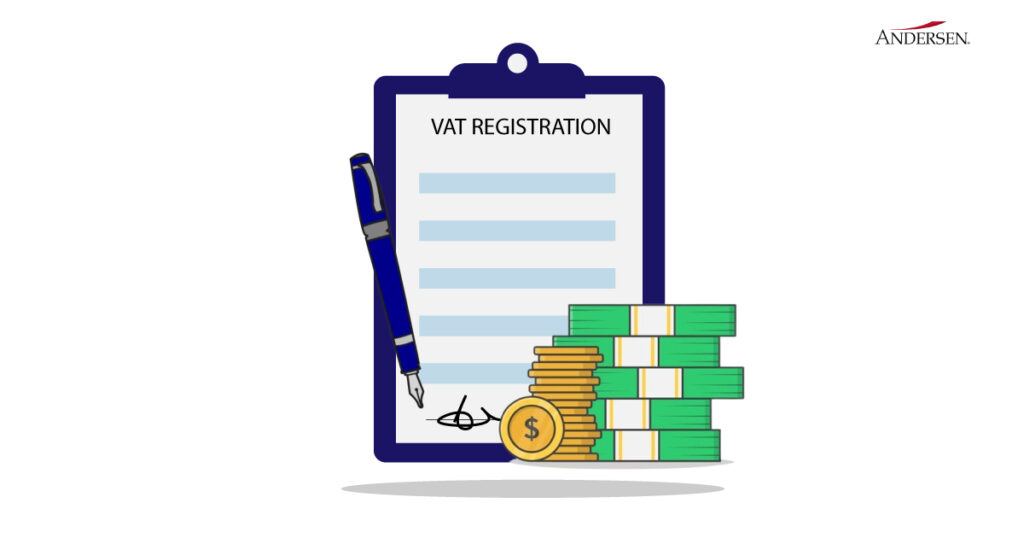Value Added Tax (VAT) plays a key role in Georgia’s tax system, and understanding the rules for registration is essential for businesses and entrepreneurs operating in the country. Businesses can register for VAT under the Tax Code of Georgia in two ways: mandatory registration, where the law requires registration once specific thresholds or conditions apply, and voluntary registration, where a business chooses to register even without meeting those mandatory requirements.
Mandatory VAT Registration
A taxable person must apply for VAT registration within two business days after their taxable supplies exceed 100,000 GEL in any continuous 12‑month period. When calculating the 100,000 GEL threshold, the person excludes certain VAT‑exempt transactions. However, this exclusion does not apply if the VAT-exempt transactions are the principal activity of the business, if they involve the export of goods, or if they are specific transactions exempt under the Georgian Tax Code.
In some cases, the obligation to register arises even before reaching the threshold. For example, a taxable person engaged in the production of excisable goods (alcohol, tobacco, petrol, etc.) in Georgia must register prior to supplying those goods. If a new business forms through reorganization and any party is already a VAT payer, the new entity must register before making taxable supplies. The entity must complete registration no later than 10 days after the reorganization ends.
The rules also apply to enterprises receiving goods or services as a contribution from a partner/shareholder who is a registered VAT payer. In such cases, the receiving entity must register for VAT before performing taxable transactions. The entity must complete registration no later than 10 days after the contribution.
For persons with a fixed establishment in Georgia, VAT obligations begin once they supply taxable goods or services, regardless of the annual threshold. They must complete registration by the end of the reporting period in which the taxable transaction occurs. A fixed establishment means a place outside the main establishment of a non-resident taxable person. It must show consistency and possess adequate human and technical resources that allow it to provide or receive services for its own needs.
Voluntary VAT Registration
Businesses that do not meet the mandatory threshold or conditions may still choose voluntary VAT registration. This choice can be strategic because only a qualified VAT payer can claim input VAT credits and reduce tax costs. A business must register for VAT to benefit from the right of deduction. Even if a business is not a qualified VAT payer when the transaction occurs, it may still claim the deduction later. The claim remains valid if the business registers as a VAT payer at the time of the transaction.
Qualified vs Non-Qualified VAT Payer Status
In Georgia, the Revenue Service must first confirm eligibility before newly registered VAT payers become qualified. Until then, they remain non-qualified. Non-qualified VAT payers cannot deduct input VAT from their taxable base. As a result, the business cannot reclaim any VAT paid on purchases or expenses, and that VAT becomes part of its costs.
To become a qualified VAT payer, a business must demonstrate real economic activity, provide supporting documentation. Once qualified, the business gains the right to claim input VAT deductions – including on the VAT invoices received before obtaining a qualified VAT payer status. This significantly improves cash flow efficiency.
This distinction is essential for companies that regularly incur VAT on goods and services, as only qualified VAT payers can fully exercise the right of deduction.
VAT Deregistration and Cancellation of Registration
VAT registration is not necessarily permanent. If, over the last 12 months, the total value of taxable transactions (excluding VAT and specific exempt transactions) does not exceed 100,000 GEL, and at least one year has passed since the VAT registration date, the business may apply for deregistration.
In some cases, with the taxpayer’s consent, the tax authority may also cancel VAT registration on its own initiative.
VAT registration cancels automatically in Georgia under certain circumstances, including:
- When an enterprise or organization is liquidated, from the date of deregistration in the State or Entrepreneurial Register.
- In the event of an individual’s death, from the date of death.
- Upon the taxpayer’s application or consent to cancel, from the first day of the month following submission.
- If bankruptcy proceedings are opened under Georgian law, from the date the court ruling is published.
The Minister of Finance of Georgia issues orders that establish detailed procedures for VAT registration and deregistration.
Why VAT Registration Rules Matter
Understanding the VAT registration rules is critical for ensuring compliance and avoiding penalties. Missing a mandatory registration deadline can lead to significant tax liabilities and fines, while voluntary registration can sometimes provide a competitive advantage in certain industries. Businesses should regularly monitor their taxable transaction volumes and review their activities to determine their registration obligations or opportunities.
About Andersen Georgia
At Andersen Georgia, we assist companies, entrepreneurs, and investors in navigating Georgia’s VAT framework, from determining registration obligations to managing ongoing compliance and planning for optimal tax efficiency. Our team provides end-to-end support with registration, deregistration, and VAT reporting to ensure full compliance with Georgian tax law.
Note: This article is based on Georgian legislation and publicly available information as of August 2025. This information serves informational purposes only and does not provide legal or tax advice. Readers should seek professional guidance tailored to their specific circumstances before making any decisions based on the information herein.

